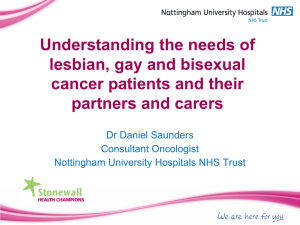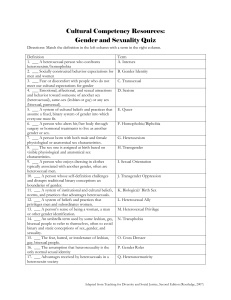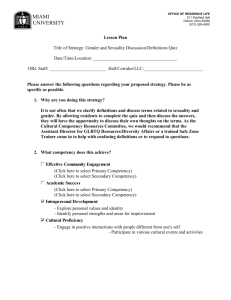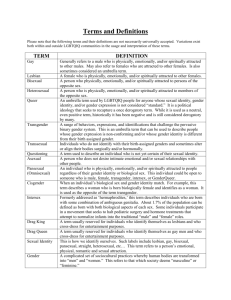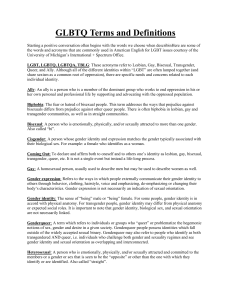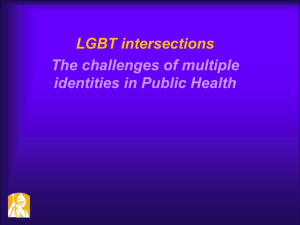File
advertisement
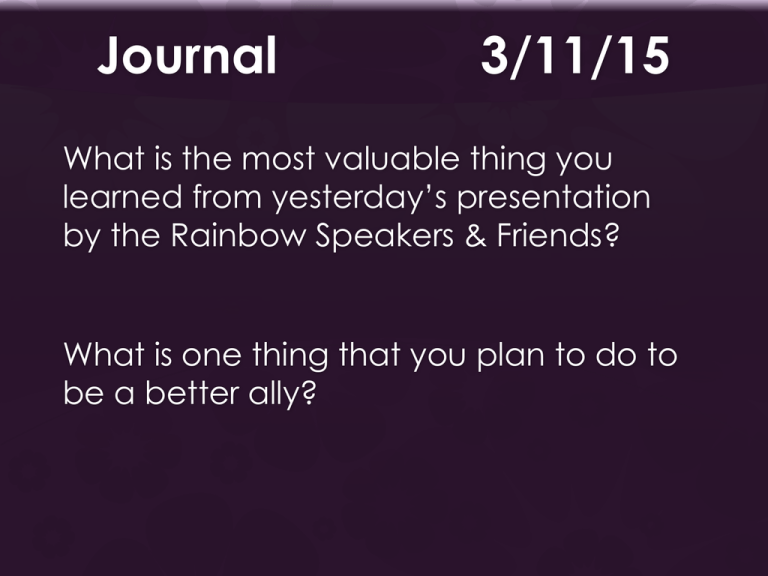
Journal 3/11/15 What is the most valuable thing you learned from yesterday’s presentation by the Rainbow Speakers & Friends? What is one thing that you plan to do to be a better ally? Re teaching Gender & Sexuality http://putthisonthemap.org/education/reteachinggender-and-sexuality/ LGBTQ Objectives 1. Define ten relevant terms (gender, gender identity, gender expression, sexual orientation, lesbian, gay, bisexual, heterosexual, transgender, cisgender) & the acronym LGBT (Lesbian, Gay, Bisexual and Transgender). 2. Distinguish among facts and common fallacies (myths/stereotypes) regarding LGBT people. 3. Describe at least one strategy for working to end anti-LGBT harassment and violence or to otherwise act as an ally to LGBT people. Love doesn’t know prejudice. Love conquers all. http://skeleton- love.diply.com/auntyacid/kissing-skeletonslove-has-no-labels/101140 Notes Sheet Review Heterosexual means… A man who is only sexually attracted to women or a woman who is only sexually attracted to a man. “Straight” Heterosexual Questionnaire Please answer the following questions as honestly as possible… Heterosexual Questionnaire 1. What do you think caused your heterosexuality? 2. When & where did you decide you were a heterosexual? 3. Is it possible this is just a phase and you will out grow it? 4. Is it possible that your sexual orientation has stemmed from a fear of others of the same sex? 5. Do you parents know you are straight? Do you friends know- how did they react when they found out? Heterosexual Questionnaire 6. Why do you insist on flaunting your heterosexuality… can’t you just be who you are and keep it quiet? 7. Why do heterosexuals try to recruit others into this lifestyle? 8. A disproportionate majority of child molesters are heterosexual… do you consider it safe to expose children to heterosexual teachers? 9. Just what do men and women do in bed together? How can they truly know how to please each other, being so anatomically different? Heterosexual Questionnaire 10. Could you trust a heterosexual therapist to be objective? Don’t you feel that he or she might be inclined to influence you in the direction of his or her learning? 11. There seem to be very few happy heterosexuals. Techniques have been developed that might enable you to change if you really want to. 12. Have you considered aversion therapy? (exposed to stimulus while experiencing discomfort) The heterosexual questionnaire was created back in 1972 to put heterosexual people in the shows of a gay person for just a moment. Questions and assumptions made of Gays and Lesbians that are unfair, are reserved and this time asked to the straight people. -Marin Rochlin, PhD, 1972 http://queersunited.blogspot.com/2008/04/heterosex ual-questionnaire.html “When did you choose to be straight?” http://www.upworthy.com/watch-thesestraight-people-answer-a-question-gay-peoplehave-been-asked-for-years-6 Imagine a World Where Being “Gay” the Norm & Being “Straight” the Minority https://www.youtube.com/watch?v=CnOJgDW0gPI THINK- PAIR- SHARE How did this video change your view about the way that LGBTQ people are treated? Did this make you more empathetic (or understanding) to issues that youth LGBTQ face? 8 True Stories… Vickie’s Story My name is Vickie and I'm 18 years old. Take a bunch of different ethnicities and throw them into a blender, I am the product of that. I am a sexual violence peer educator, Gay Straight Alliance peer educator, a mentor, and a member of the Black Achievers program. I believe that "true love" has no sexual preference/orientation but I do not envision myself spending my life with a male. When I was about 13 I came out to my mother. I didn't say that I was gay or lesbian because all that I knew was that I liked girls. The first thing my mother said was, "Oh...I knew when you were 8." I thought that meant that she was okay with it. Well, from there words like "dyke," (as well as others that I don't care much for) were used on a regular basis in regards to me. I was "outted" to my family and pretty much everyone else I had ever known. Some nights I was kicked out of my house and on those nights I became another child sleeping on park benches. I am a survivor of many different things: sexual violence, depression, the military, road ragers, myself, and life in general. Life for me has changed a lot since I was 13. I now identify as lesbian and sometimes I am even given some transgender labels. I no longer live with my mother or father but for the first time in my life I actually have "real" parents. I am currently a senior in high school, I love it, and I am ecstatic about living in a dorm next year. I am a varsity cheerleader and softball player but the sport that I enjoy the most is tennis. I believe that every challenge in our lives will change us in some way and I use my experiences as fuel for the fire in me that drives me to do new things. Sometimes you have to make your own light at the end of the tunnel but you don't have to do it alone. Braden’s Story I was raised in a community of 2,000 people, very rural and very sheltered. Diversity in this town is bowling on Tuesdays instead of Saturdays. The word gay is rarely used nicely and the only African-American families that have moved here have been driven out by close-minded locals. As long as I can remember I have spoken my mind, and eventually I told people (sometimes the WRONG people) that I was gay. It wasn't even something I had struggled with, I just knew, I had always known. Unfortunately, many people cannot understand that. On the second day [of high school] I was walking down the hall and a young male said the word that wounds every gay teenager... "fag." From there, things snowballed. Daily more and more people would use those hate words "fag, homo, queer, sissy, etc," on one occasion I was asked if I thought I was a [racist term] because I had worn all black that day. Eventually things moved to violence and pranks. The word "Faggot" (it was misspelled by the way) was written on the locker next to mine, only because they made a mistake of whose locker it was. There are more things that happened, but I really do not think it is necessary to name them all. The school did "the best they could do" (as they put it). In my mind little was done. One day in February, I was attacked in the hallway, I do not remember much of it, as my head was hit on the locker several times and I must have blacked out or something. That was the last day of school for me. For a month I stayed in bed, scared, depressed, angry, and even suicidal at times. The school did not offer to help with schooling, or even make the effort to call and see how I was doing. In retrospect, I need to thank a lot of people for keeping me alive. I was lucky. So many innocent teenagers go through this same kind of thing, many end their own lives because of the ignorance out in the world. Quinn’s Story In terms of my gender, I have always felt different. When I was younger I was called a tomboy, which I was very proud of. I was often asked if I was ‘a boy or a girl’. I’d always felt like those of us who embraced those words the most, tomboys and such, never really were girls to begin with. We were always something else entirely. But for the first fifteen years of my life, I always did what was expected of me and I said that I was a girl. When I was fifteen I started identifying as transgender and telling a few people that I was a boy. But that never felt right either. One thing I’ve struggled with is the expectations and assumptions people put on me. I’m expected to be a boy or a girl, a stereotypical boy or girl. I’m a genderqueer person, someone who doesn’t identify within the binary system of gender (where the only choices are male or female). I’ve never felt the need to fit a stereotype. So, while I dress in a more masculine way and go by a gender-neutral name, strangers often assume I’m a girl, and call me ‘she’. This happens almost everyday. And while I don’t feel male, I still ask people I know to refer to me by male or gender-neutral pronouns (he, they). It’s extremely exhausting having your identity questioned every single day. It’s exhausting worrying about the questions that could come up if you do manage to summon up enough courage to tell a total stranger that you don’t use female pronouns and this is why. In contrast, the times I hear ‘he’ or ‘young man’, it can make my whole day better. I want to see people like me, gender benders and breakers of all kinds, celebrated for our identities. I want to see you questioning your assumptions and asking questions. I want to see my people’s history pulled out of the cracks where it’s been pushed aside and taught in schools. I want you to be able to express yourself to the fullest and be respected for it. And I will keep fighting, writing, questioning, educating myself and others, listening, playing music, telling stories, singing songs, and expressing myself, ‘til we’re all free. Andrea's Story When I was in 10th grade I finally realized that maybe I was different. Soon, though scared, I came out as bisexual to a couple guy friends. I was worried about losing my female friends, so I kept my orientation a secret from them. However, after breaking up with my then-boyfriend, he decided to out me to all my friends. It was an attempt to hurt me, but it actually was one of the best things that could have happened to me. Once he told everyone, I could not hide anymore. A few friends were freaked out and did not treat me the same, but most people accepted me for who I was. It really was not even an issue to most people. After seeing the acceptance from my friends, I got the courage to tell my mom and my aunt. Coming out to them was so great and untraumaticthat both my mom and I cannot really remember how it happened. My mom and my aunt are completely accepting, and I love them dearly for it. Being outted made me face my orientation and showed me that I did not have to be ashamed of it. Since going off to college, I looked at my orientation and decided that I was more comfortable calling myself lesbian rather than bisexual. I am not one for labels, but I feel better with this one. I am out at my job, and at school. I do not mean that when I meet people, I say, "Hi. I am Andrea, and I'm gay!" Nevertheless, I do not hide my orientation. I refuse to play the "pronoun game" and hide in fear. I treat it as a natural part of me, and as not a big deal, and thus people do the same when dealing with me. David's Story I was 15 when I decided to come out. I had always known something was different. I had girlfriends but never wanted to do anything sexual -not even kiss them. Online, I had looked at gay stuff just wondering about it since I never knew anyone gay. Then I thought "I may be gay." So I ended up telling my friend and she was perfectly fine with it. About a week after I told my friends I planned on telling my mom. Of course, I thought of the worst possible thing would happen. So we were coming back from my foot operation and I told her. And I told her I didn't want to tell dad because he may not be accepting. She told me she wanted me to so that they could talk openly about it. So after we got home she made me go to the store with him. And I just told him. And his exact words were "So? I still love you." I was shocked. Here I had been worried sick about my parents beating me up and kicking me out of the house. Then I had a date with my first boyfriend. We were both 15, so of course my dad drove us. It was so cool. I felt good about it and knew it was what I wanted, but we ended up breaking up about one month after getting together. Then I hooked up with my next boyfriend and we went to the movies. That lasted 6 months. He would come see me everyday and hang out with me and my family. He ended up spending Christmas with my family and I spent New Year's Eve with him and his friends. Everyone was really accepting of us. It was shocking. I am lucky. I am out at work, and I do find the occasional person that has a problem with it. But I just stay away from them. That is what I have found in life. Shin’s Story Hi there! My name is Shin, I'm 23, and an Asian-American bisexual male. I am a college graduate, with a degree in political science. I work at a non-profit organization that works to protect the civil liberties of everyone in the country. In many ways, I have always been in the "minority." I was born in a small blue-collar town on the East coast, where my family was the only Asian family for the longest time. Indeed, I am the first in my family to be born in the States. I have an older sister, and for the longest time, I was always following in her footsteps. However, when I was 12, my family, minus my college bound sister, moved to Tokyo, Japan, due to my father's job. There, I was again in the minority - a kid who had spent all his life in the states, and who didn't really know how to speak Japanese. I actually ended up switching from the public schools to an all-male Catholic international school for high school. After high school, I came back to the States for college on the East coast. It was in college that I truly came out to myself, my friends, my peers, and some members of my family. I found it comforting to find people my age who were in the process of coming out, or had already come out to themselves and their friends and family. Even now, I find that I am sometimes at odds with myself. Being bisexual often puts me in "neither camp." There are days that I think it would be easier if I just "choose a side," but then I know I wouldn't be fair to myself. For me, it’s about the person, not the gender. Yes, true bisexual people do exist - we aren't just steps in the journey of coming out. Ben's Story Hey everyone! My name is Ben, and I'm an 18 year old transboy growing up in eastern Pennsylvania. I am currently a junior at my high school, and I also have a part-time job after school. I came out as transgendered my freshman year of high school when I asked my teachers to call me by my preferred name, as well as to use masculine pronouns when referring to me. Surely, I thought, this would lessen my feelings of isolation and help me to feel more at home with myself. I received a mixed reaction that was rather confusing. While coming out did help me become more comfortable with myself, my feelings of loneliness did not subside. I found myself repeatedly explaining how I felt, and constantly attempting to clarify misinterpretations. I felt so misunderstood. Yet, each explanation, though tiring, seemed to give me more confidence. I decided to start a GSA (Gay-Straight Alliance) to bring people together in my school. There had to be a few people out there who were supportive, I thought. I was right. The GSA had an amazing turnout, bringing many people together to discuss how they feel and what is going on in our school. I no longer felt alone, and I felt optimistic about the change that our group would cause in our school. Slowly, my coming out process helped me evolve into the person I am today. I grew more than I ever thought I would. Fortunately, I have the support of my immediate family and a few friends and teachers. With my mom's consent, I began my medical transition by taking testosterone in July. I continue to feel more comfortable and confident with each day that passes. I am forever changed by the events that have taken place, and by the people I have made contact with. Miriam's Story My name is Miriam. I grew up in a small town in New Jersey. Ever since I can remember, I have been attracted to people of all genders. When I was 9 or 10, I realized that this was considered bad, so I tried really hard to be straight. After a year of this, I realized that I could not stop being attracted to girls. The only person I told at that point was my sister, who was 8. She was very accepting and supportive then, and has been ever since. In high school, I was afraid to come out, both at school and to my parents. I was dating a boy for most of high school, so it was easy to hide. I was afraid that if people found out, the homophobic students would harass me, the more "liberal" students would think I was just saying it to be trendy, and my parents would think it was just a phase. Looking back, I think that it would have been worth it. I made the decision that no matter what, I was going to come out when I got to college. Luckily, I went to a school where most people were very accepting, so coming out at school was easy. I told all of my friends, hall mates, professors, teammates (I play ultimate Frisbee.) etc, and I also joined the student organization for LGBT/queer students. I also came out to my parents. While it didn't go perfectly, it went a lot better than it does for some people, and things have gotten a lot better over time. It really helped me to have the support of my sister, as well as the support of my friends at school. I have found that when I am confident about who I am, people either accept me or keep quiet about it. QUESTIONS: 1. Based on real people you know (no names please) and given what you’ve heard and read in class todayhow do you think people know what their gender identity is? How do they know if they’re supposed to be a boy or a girl? 2. What about sexual orientation? How do people figure out if they are gay, lesbian, bisexual or straight? 3. What myths or stereotypes about LGBTQ people did you used to believe that you’re starting to realize aren’t true? 4. What could be done to make EAHS a more positive place for the students telling these stories? What can YOU do to be a better ally? Other Sources https://www.facebook.com/RainbowSpeak ersAndFriends http://www.diversitycenter.org/trianglespea kers/ http://community.pflag.org/ http://youthspace.org/ Works Cited http://skeleton-love.diply.com/auntyacid/kissing-skeletonslove-has-no-labels/101140 http://queersunited.blogspot.com/2008/04/heterosexualquestionnaire.html http://www.upworthy.com/watch-these-straight-peopleanswer-a-question-gay-people-have-been-asked-for-years-6 https://www.youtube.com/watch?v=CnOJgDW0gPI http://putthisonthemap.org/education/reteaching-genderand-sexuality/ FLASH curriculum Rochester Gay Alliance, Rochester NY

